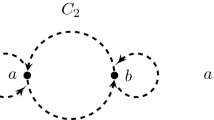Conclusion
I think that the epistemological theory presented by Plantinga would be more plausible if it were amended in a way that would be consistent with the no-foundations view suggested above. We have considered in detail his conception of basic beliefs in Section II above, and noted that his conception of basicality was obscure. For Plantinga, beliefs are basic only under certain conditions, and this is an obscure notion of basicality because unlike basic beliefs in a more traditional foundationalist theory, there is no incorrigibility at the foundation, with no suitable substitute. Consequently, a foundationalist like Plantinga is faced with the same problem he thinks is inherent in coherentism; namely, how warrant for the noetic structure is guaranteed.
In fact, it is unclear how Plantinga's version of foundationalism differs significantly from Williams' no-foundations view. If the noetic structure is potentially unlimited in the way that I have suggested, one could have a temporally local foundationalism which is consistent with Williams' no-foundations view, for all of Williams' arguments attack the notion of ultimate warrant for the noetic structure. And if, at a given time, a person takes certain beliefs in their noetic structure as basic contingent upon subsequent assessment of those beliefs, we have something very much like Plantinga's foundationalism. Such beliefs would be ‘basic’ in the sense of being non-inferentially credible, but this would not entail their functioning as grounds for the noetic structure as a whole, for the element lacking in this no-foundations view is the certain sort of experience which Plantinga thinks is necessary as a ground of the basic belief. But given the problems discussed above concerning criteria for basicality and the consequent problems concerning the identification of what sorts of experience function as a suitable ground, it is unclear in what way Plantinga's position is preferable.
Plantinga's fundamental objection to a coherence view of justification was that there is no way of accounting for ultimate warrant for a noetic structure. But in reference to his own theory, Plantinga states that:
The justification-conferring conditions mentioned above must be seen as conferring prima facie rather than ultima facie, or all-things-considered justification. This justification can be overridden. (“Reason”, 83)
If, however, basic beliefs are merely prima facie justified and can be overridden, then there is no accounting for ultimate warrant in theological foundationalism either. Basic beliefs in a foundationalist position are supposed to serve the function of providing an end to the process of justification, but they do not serve this function in Plantinga's system. In defending the no-foundations view of justification, Williams recognizes that some beliefs are in fact accepted as non-inferentially credible or that some beliefs happen to be reliable (86, 94). If this is all that basic beliefs amount to, i.e. beliefs that are prima facie credible yet still defeasible, then theological foundationalism may as well scrap any hope of supplying adequate grounds for a noetic structure.Footnote 1
Similar content being viewed by others
Notes
Although more recent developments of foundationalism and coherentism, e.g. Laurence BonJour's The Structure of Empirical Knowledge (Cambridge: Harvard University Press, 1985) and William P. Alston's Epistemic Justification (Ithaca: Cornell University Press, 1989), contain refinements of the two theories which, ultimately, need to be considered in order to resolve the problems I raise here for theological foundationalism, I do not think these refinements significantly affect the arguments I present in this paper. In any case, I am considering these modifications in a work in progress.
References
Alston, William P. Epistemic Justification. Ithaca: Cornell University Press, 1989.
BonJour, Laurence. The Structure of Empirical Knowledge. Cambridge: Harvard University Press, 1985.
Chisholm, Roderick. Theory of Knowledge, second edition. Englewood Cliffs: Prentice-Hall, 1976.
Cornman, James. Skepticism, Justification, and Explanation. Boston: D. Reidel, 1980.
Grigg, Richard. “Theism and Proper Basicality: A Response to Plantinga.” International Journal for Philosophy of Religion. 14 (1983): 123–127.
McLeod, Mark. “The Analogy Argument for the Proper Basicality of Belief in God.” International Journal for Philosophy of Religion. 21 (1987): 3–20.
Moore, G. E. “Proof of an External World.” Proceedings of The British Academy (1939): 273–300.
Plantinga, Alvin. “Reason and Belief in God.” In Plantinga and Nicholas Wolterstorff (Eds.), Faith and Rationality: Reason and Belief in God, 16–93. Notre Dame: University of Notre Dame Press, 1983.
Plantinga, Alvin. “Coherentism and the Evidentialist Objection to Belief in God.” In Robert Audi and William Wainwright (Ed.), Rationality, Religious Belief, and Moral Commitment: New Essays in the Philosophy of Religion, 109–138. Ithaca: Cornell University Press, 1986.
Rorty, Richard. Philosophy and the Mirror of Nature. Princeton: Princeton University Press, 1979.
Williams, Michael. Groundless Belief. Library of Philosophy and Logic. New Haven: Yale University Press, 1977.
Wittgenstein, Ludwig. On Certainty. New York: Harper and Row, 1972.
Author information
Authors and Affiliations
Rights and permissions
About this article
Cite this article
Zeis, J. A critique of Plantinga's theological foundationalism. Int J Philos Relig 28, 173–189 (1990). https://doi.org/10.1007/BF00134514
Issue Date:
DOI: https://doi.org/10.1007/BF00134514



